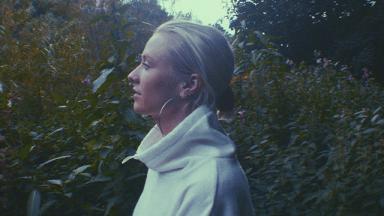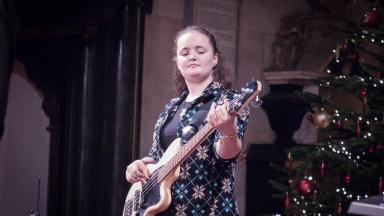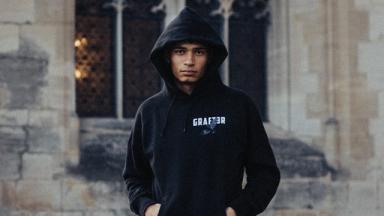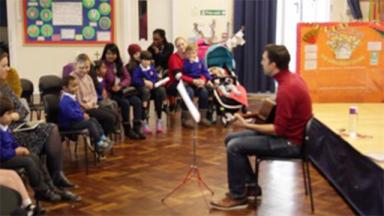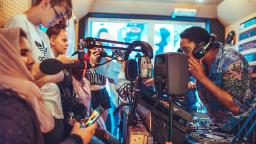
Written by Lily Fontaine, as part of Youth Music Next Gen.
Based 20 miles outside London in Slough, one of the country’s most ethnically diverse towns, the Youth Music funded Beat Routes project provides a space for the nurturing of artistically inclined youth. I spoke with two of their students-turned-apprentices about how working with and for the organisation has impacted their lives for the better.
Who are you, where are you from and what kind of music do you make?
Devonte: I'm Devonte but people call me Dev for short. I'm originally from the Caribbean. I grew up there until I was 16 and then I came here. I'm a music producer and I produce hip-hop, Soca music, and I try to sample a bit of jazz into it - kind of fusing genres together.
Rebecca: My name is Rebecca, I'm from Slough and I do more spoken word stuff.
Did you make music before getting involved in Beat Routes?
Devonte: My family wasn't that musical but my father came here way back and he got into the whole music scene, and I guess I kind of picked it up from there. He plays the drums, so that was the first instrument I learned. I played keyboard a bit, a bit of the acoustic guitar and a bit of the bass. I started playing in a live reggae band around the age of 16 - I don’t do that anymore but I play the keyboard for church every Sunday.
Rebecca: To be completely honest, when I first joined Beat Routes it was just a songwriting session. I didn't know all that much about music - I knew as much as the average joe next door who listens to music, but I didn't know too much about the in-depth things to do with it.
How did you first get involved with Beat Routes?
Devonte: I was referred to Beat Routes by another music organisation at the local library - I offered to help them teach the young people music and they put me on to one of our staff members and I've been going every week ever since. Even though we weren't staff, Rebecca and I would be involved in a lot of the encouragement side of things, and I guess they saw the love and passion for music in us and tried to give us a chance to do it. I'm really grateful; this is my first job ever officially. I'm eternally grateful to Beat Routes for everything.
Rebecca: I got involved with Beat Routes through my youth worker at the time. I wasn't in school but I was looking into after-school and youth activities to go to. It was originally advertised as a songwriting session, and I'm really into writing so I thought - that looks like good fun. As time progressed and there were more sessions, I eventually got hired as an apprentice too.
What happens at a typical Beat Routes session?
Devonte: On Mondays for the music production sessions, there's this expert called Tony who will come in and teach us from the ground up, starting from the foundation and giving us really helpful tips that most people miss if they are learning on YouTube. There are free music writing sessions on Tuesdays and Wednesdays: on Tuesdays it’s poems, but on Wednesdays, it’s more musical song writing. They would give us a team to start our writing with, and then give us guidelines and tips.
Rebecca: We do a lot of right-hand-man type of stuff. So, when we were in person [before lockdown] I was doing a lot of helping to set up and put away the sessions: setting up equipment and doing the register. If there are any forms young people need to fill out we might distribute the forms or collect them. Also, just engaging with the young people - for example, if they don't understand the task, we could help explain it to them. Or if they need somebody to talk to, because a lot of our sessions are quite social, we can just be there to lend an ear and maybe try to give some advice.
What have been your favourite experiences as part of Beat Routes?
Devonte: It's kind of weird since Rebecca is right here, but one of my favourite experiences has been hearing Rebecca rap for the first time! Because for the first couple of months, I’d never heard her rap in person, and then one day she just blew my mind. It was one of the best moments for me.
What are your proudest achievements as part of Beat Routes?
Rebecca: Technically, it's not in a Beat Routes session but, because of Beat Routes, I was introduced to a spoken word collective called Empowered. Twice now they've invited me to perform and I feel like, without the confidence base I got from Beat Routes, I would never have felt able to go up on the stage.
Devonte: Before joining Beat Routes I was quite a shy person - I'd never sung in front of anyone before. The guys at Beat Routes encouraged me so much that in two weeks I was singing in front of a room of people. Also, we had this session where we went to Soho Radio in London. I made a beat for one of the songs that they wrote, and that beat was played on the radio.
How have Beat Routes helped your musical skills?
Devonte: Beat Routes have so much equipment, like synthesizers and drum machines, that most people wouldn't be able to afford. They also brings in experts who shed a bit of light and knowledge on us.
Rebecca: With Beat Routes, it doesn't matter where your knowledge lies in music. If you've got an interest in it, then there's something anyone can learn. For example, Dev really knows a lot more about music than I do, because I didn't know anything, to begin with, but we both still learn things. I’ve kind of been introduced into the world of music and music equipment as a whole and sometimes it's overwhelming, but someone's always willing to sit with you and show you; it's all very hands-on and everything just seems very approachable.
How have Beat Routes helped you personally and socially?
Devonte: The way it’s impacted me the most is my confidence in performing live, as well as with my social skills because I'm a shy person.
Rebecca: Same really; I'm quite a shy person and I used to hate group sessions because I'd worry that nobody would want to hear what I have to say. I just find it really anxiety-inducing meeting new people. However, Beat Routes is quite a different environment - it has quite a family feel. So that really helped me in terms of realising that, if these people at Beat Routes are willing to listen and they're not going to judge me, then I could apply that in any group situation. I realised I didn’t need to worry about my being there having some sort of negative impact. Once you get comfortable at Beat Routes, it opens your eyes to the fact that not everybody is judgmental, and there are so many good people out there who are willing to just accept you.
What’s living in Slough like?
Devonte: Slough is unlike anything you've ever seen. It's so diverse with so, so many cultures clashing and coming together. And all these different cultures are kind of inspiring each other to the point where you can hear it back in the music. The art is reflecting it back. I don't know if you have heard of the Trading Estate, but it's a hard-working community. It has quite a lot of musicians now and so many people write a lot of music on the low. A lot of rappers are inspiring people, and there are some really underrated people. For example, there is this one rapper called ‘Skard’ and he's better than anything I've heard on the radio, period. It's so underground but there's definitely a music scene in Slough that needs to be brought up more.
Rebecca: Slough is kind of like Marmite. I feel like everyone could learn to love it but, from an outside perspective, if you were looking in on the town, sometimes it can be quite easy to focus on the bad things. I feel like it doesn't have the best name or reputation. But, as somebody who lives in Slough, there's such a strong community because the things that happen here create a stronger bond within the people. For example, there's quite a lot of youth crime within the town, but that means that the groups that we have are quite strongly bonded, because we know that the things we are doing are really necessary in a place where things could go so differently. These groups that we have, I feel like we understand and appreciate the importance of them even more.
What are your plans and hopes for the future?
Devonte: I'm quite into the arts and I would like to make a living out of music. I don't really want to be rich or successful, I just want to be happy and centre my life around music. Also, lately, I've started photography, as Beat Routes have a Thursday session where they bring in a photography expert. So now I'm quite good at photos and editing, and I've got a whole Instagram page for my work. Even though Beat Routes is a music-intensive charity, they open us up to different art forms and different skills - because you’ll notice these days that popular artists are not just good at one skill, but a variety.
Rebecca: I was in college studying makeup and I was really set on that being what I was going to do with my life. But from quite a young age I was also really into photography and I don't know now, I'm a bit torn on which path to go down. I wanted to do makeup for so long, but part of me also wants to do photography and maybe song writing. I feel like Beat Routes has made me realise that I don't have to just pigeonhole myself.
What has working with Beat Routes meant to you?
Devonte: Beat Routes is more than just music now, it's like a family. My week is kind of centred around Beat Routes, especially with the whole isolation thing - these online sessions have meant a lot to me and I intend to continue doing it for as long as I can. Beat Routes is a new family I've been brought up into; I have my biological family, my church family, and now I have my Beat Routes family.
Rebecca: Like Dev was saying; Beat Routes is such a family. As somebody that didn’t have a big group of friends before Beat Routes, I feel like it has such a community feel and introduces you to so many people. Even outside of the sessions I've met so many people through Beat Routes. It's great because you have a shared interest - you know everybody's there for the music. So I feel like it's just a great way to socialise, make friends and build up your confidence. It's encouraged me so much in life - like Dev said, during lockdown, it has given me purpose. There's so much love, and the passion that you see in other people makes you feel more passionate. You go to a Beat Routes session and you see all these people who have these ideas and put their heart into them, and it makes you think: if they can do it, so can I! It makes you feel like you can create constantly - I wouldn't have created 90% of the stuff that I have over lockdown if it wasn't for Beat Routes sessions where we're encouraged to sit down at a set time and just create.
Thank you to our funders; the National Lottery via Arts Council England, players of People's Postcode Lottery, and support from donors, partners and fundraisers, who make our work supporting young peoples' lives through music possible.
You may also like...
Eskimoh, the 23-year-old music producer on her time with Music:Leeds
Next Gen Lily Fontaine spoke to upcoming, 23-year-old, electronic music producer Jessie Pigott, a.k.a. Eskimoh, about the support she’s received through Music:Leeds’s emerging-artist support programme, Launchpad in West Yorkshire.
Volunteer-turned-Music Leader, Shannon, discusses working at Action on Disability
Next Gen Lily Fontaine spoke to Shannon, long-time volunteer turned music leader about her experience with Action on Disability.
In conversation with CubsNoCap
Gloucester-based artist CubsNoCap discusses The Music Works’ UPSURGE programme, dropping his track Phoney, and the Gloucester music scene.
Sing our Story: The community music project bringing families together
Next Gen Lily Fontaine spoke to Beata, mother to four-year-old Alex, about how making a song together has changed their relationship for the better.

